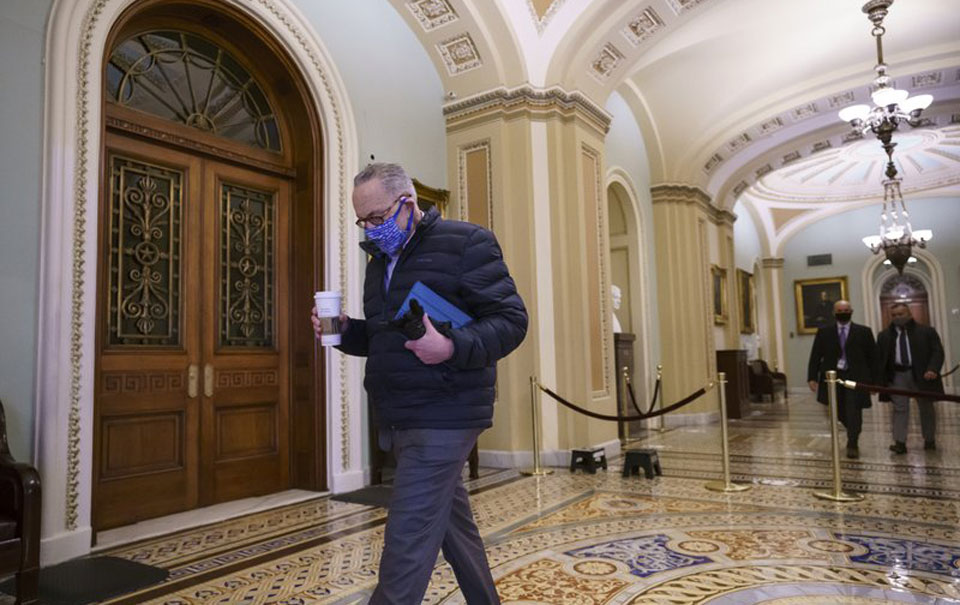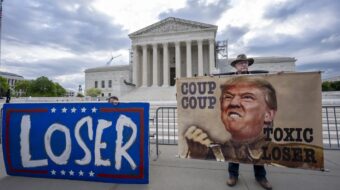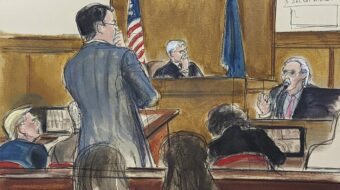
WASHINGTON — Former President Donald Trump’s historic second impeachment trial opens today and will end with the Senate deciding whether to convict him on the charge that, in a desperate attempt to hold onto office he lost in a free and fair election, he incited a deadly insurrection at the U.S. Capitol.
Trump’s expected acquittal, due to cowardice among Senate Republicans, is not stopping Democrats from trying to win over at least some of the GOP senators. They plan to do this by tying Trump’s behavior that day to horrifying images and videos of the insurrection that led to the death and destruction at the Capitol.
Among the videos will be stark images of Trump enjoying himself as he watched on television the horror unfolding at the Capitol. That alone, they note, would be cause for any president who did nothing to stop the deadly mayhem for two hours to be impeached. In Trump’s case, the House impeached him one week after the deadly insurrection on Jan. 6.
One thing the Democrats have going for them is that the senators themselves are witnesses to the events in question. Most of them had to hide and run for their own lives on that infamous day.
Trump’s lawyers will again push the discredited idea that the trial should not be held at all because the former president is now a private citizen who cannot be impeached.
They ignore the fact that he was impeached by the House while he was president and that it was the Senate itself that decided not to hold the trial until February after Joe Biden was sworn in as the new president.
Their argument also does not hold water because if a president cannot be impeached after he leaves office he could commit crimes and resign before any action is taken against him.
The Trump lawyers also argue that he did not incite the violence when he told his supporters to “fight like hell” to overturn his defeat. Even if, by a huge stretch that were true, it is undeniable that Trump was watching everything on TV for two hours and during that time did nothing to stop the deadly violence. That alone, of course, was an impeachable offense.
According to the law the House, not the Senate, does the impeaching. After the House impeaches, the Senate, under the U.S. Constitution, holds a trial. With a vote of two-thirds of the senators who are present, there is a conviction. That means that the requirement for finding him guilty is not 67 votes but just two-thirds of those present.
The House appointed nine impeachment managers who will present the case against Trump. Trump’s defense team will have equal time to make their case. They are not expected to use all their time, having not had much time to prepare. They were appointed in the last minute when the original Trump lawyers pulled out because they did not want to wage a fight in defense of Trump’s false claims that the election had been stolen.
Not presiding this time
The chief justice of the United States normally presides over the trial of a president, but because Trump has left office he will not be presiding at this trial. The largely ceremonial role of the presiding officer will be taken by Sen. Patrick Leahy, D-Vt., who is the official head of the Senate as the longest-serving member of the majority party.
Once the senators reach a final vote on the impeachment charge, incitement of insurrection, each Senator must stand up individually and vote out loud – guilty or not guilty.
Because the senators have decided to tackle first the issue of whether a trial is even constitutional it is likely that the trial will go longer than members of both parties have hoped, probably more than a week.

The agreement between Senate leaders provides for up to 16 hours for both prosecutors and the defense to make their arguments, starting Wednesday, with no more than eight hours of arguments per day. Later, there will be time for senators to ask questions, and there could be additional procedural votes.
Under the agreement, the trial will open Tuesday with four hours of debate on whether the trial is constitutional. The Senate will then vote on whether to dismiss the charge against Trump. If that vote fails, as expected, the House managers will begin their arguments on Wednesday.
There will be a pause on Friday evening for the Jewish Sabbath at the request of Trump’s defense team and then the trial will resume on Sunday afternoon. That almost certainly means a final vote on Trump’s conviction won’t happen until next week.
Trump’s first impeachment trial, in which he was acquitted on charges that he abused power by pressuring Ukraine to investigate now-President Joe Biden, lasted almost three weeks. But this one is expected to be shorter, as the case is less complicated and the senators know many of the details already, having been in the Capitol during the insurrection.
Even though this trial will be shorter than Trump’s first impeachment trial the seriousness of the issue for which he is being tried far exceeds the criminal nature of the charges last time.
Most observers say that the charges Trump faces now are the most serious ever faced by any president of the United States, including those faced by Richard Nixon.
Many legal experts say if a president cannot be found guilty in a case such as the one before the Senate now, one might as well just get rid altogether of the impeachment clauses of the Constitution. It is difficult to conceive of any president doing anything worse than what Trump did to earn the distinction of being the only president ever to be impeached twice.
It appears that there will not be witnesses called in this trial.
While Democrats wanted witnesses in the last impeachment trial, they were not allowed to call them after the GOP-controlled Senate voted against doing so.
No need this time
This time, Democrats feel they don’t need witnesses because they can rely on the images of the insurrection that played out on live television and on countless cell phones. They also argue that the senators were witnesses themselves.
If Trump is convicted, the Senate would take a second vote to bar him from holding office again, Democratic Senate Majority Leader Chuck Schumer said yesterday.
Democrats reject the idea that they should let bygones be bygones and just let the country move forward.
“You cannot go forward until you have justice,” said House Speaker Nancy Pelosi last week. “If we were not to follow up with this, we might as well remove any penalty from the Constitution of impeachment.”
Democrats are hoping that the differences between this trial and Trump’s first impeachment trial will help them make their point that Trump must not be acquitted.
Trump’s first trial was based on events unearthed over months by the House about a private phone call between Trump and the president of Ukraine, as well as closed-door meetings that happened before and afterward. Democrats conducted lengthy investigations and then compiled a report of their findings.
In contrast, the second trial will be based almost entirely on the lived experience of an insurrection that targeted the senators themselves, in the Capitol building. The trial itself is being held in a room that was breached by the insurrectionists.
The traumatizing memories of Jan. 6 could make it easier for the House impeachment managers to make their case.
The Trump lawyers are also attacking the Democratic impeachment managers themselves, going after them personally and charging that they suffer from the “Trump derangement syndrome” and are “selfish” and are only trying to impeach Trump for political gain.
They ignore the role that Trump’s lies have played in the insurrection. There was no widespread fraud in the election, as Trump claimed falsely over several months and again to his supporters just before the insurrection. Election officials across the country, and even former Attorney General William Barr, contradicted his claims, and dozens of legal challenges to the election put forth by Trump and his allies were thrown out of the courts.
Even acquittal, however, may not squash all the attempts to hold Trump accountable. Sens. Tim Kaine, D-Va., and Susan Collins, R-Maine, floated a censure resolution after last month’s vote made clear that Trump was unlikely to be convicted.
Kaine said last week that “the idea is out there on the table and it may become a useful idea down the road.”
Associated Press contributed to this report
Like free stuff? So do we. Here at People’s World, we believe strongly in the mission of keeping the labor and democratic movements informed so they are prepared for the struggle. But we need your help. While our content is free for readers (something we are proud of) it takes money — a lot of it — to produce and cover the stories you see in our pages. Only you, our readers and supporters, can keep us going. Only you can make sure we keep the news that matters free of paywalls and advertisements. If you enjoy reading People’s World and the stories we bring you, support our work by becoming a $5 monthly sustainer today.

MOST POPULAR TODAY

‘Warning! This product supports genocide’: Michigan group aims to educate consumers

After months of denial, U.S. admits to running Ukraine biolabs

“Trail of Tears Walk” commemorates Native Americans’ forced removal

Ohio: Franklin County treasurer attends Netanyahu meeting, steps up Israel Bond purchases

Hold the communism, please: SFMOMA’s Diego Rivera exhibit downplays artist’s radical politics






Comments